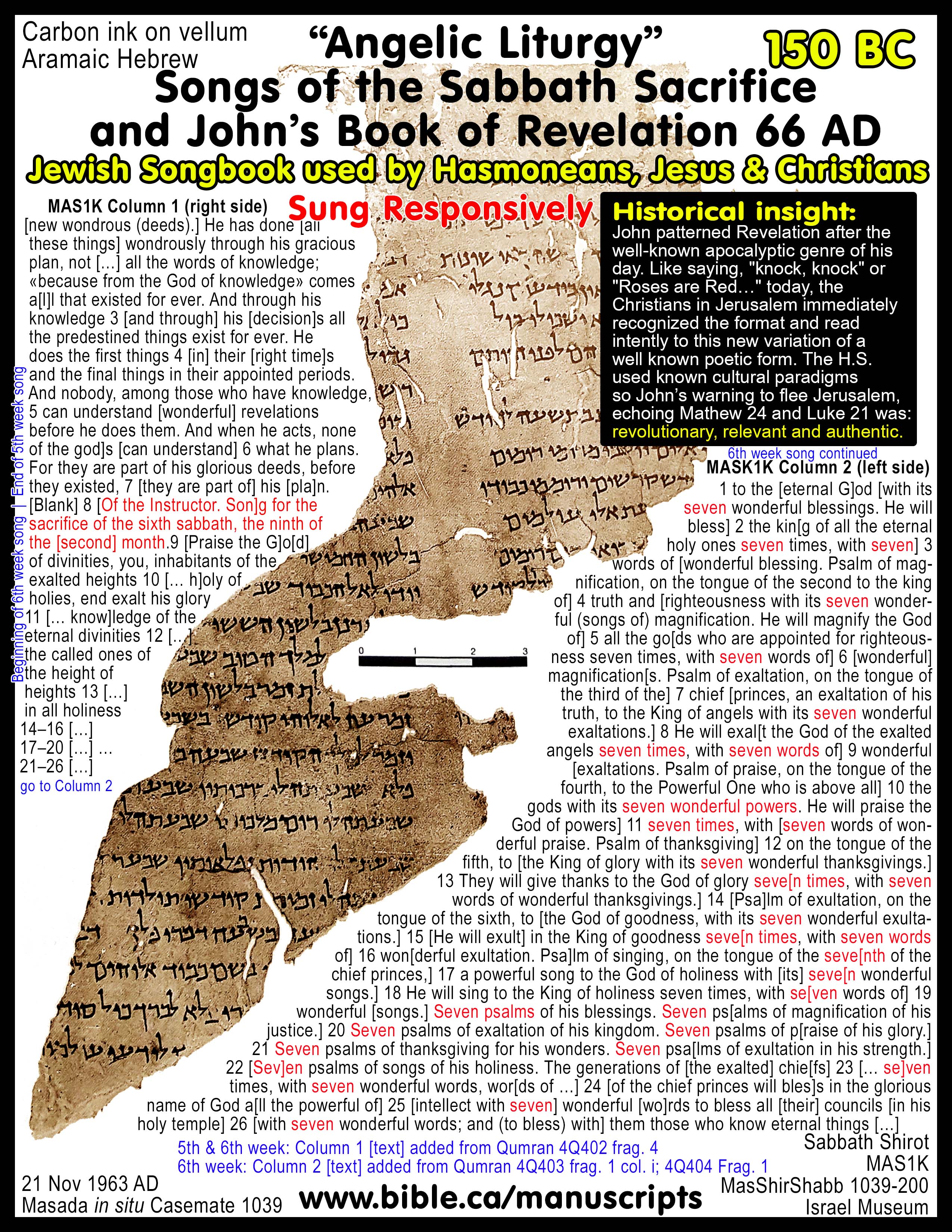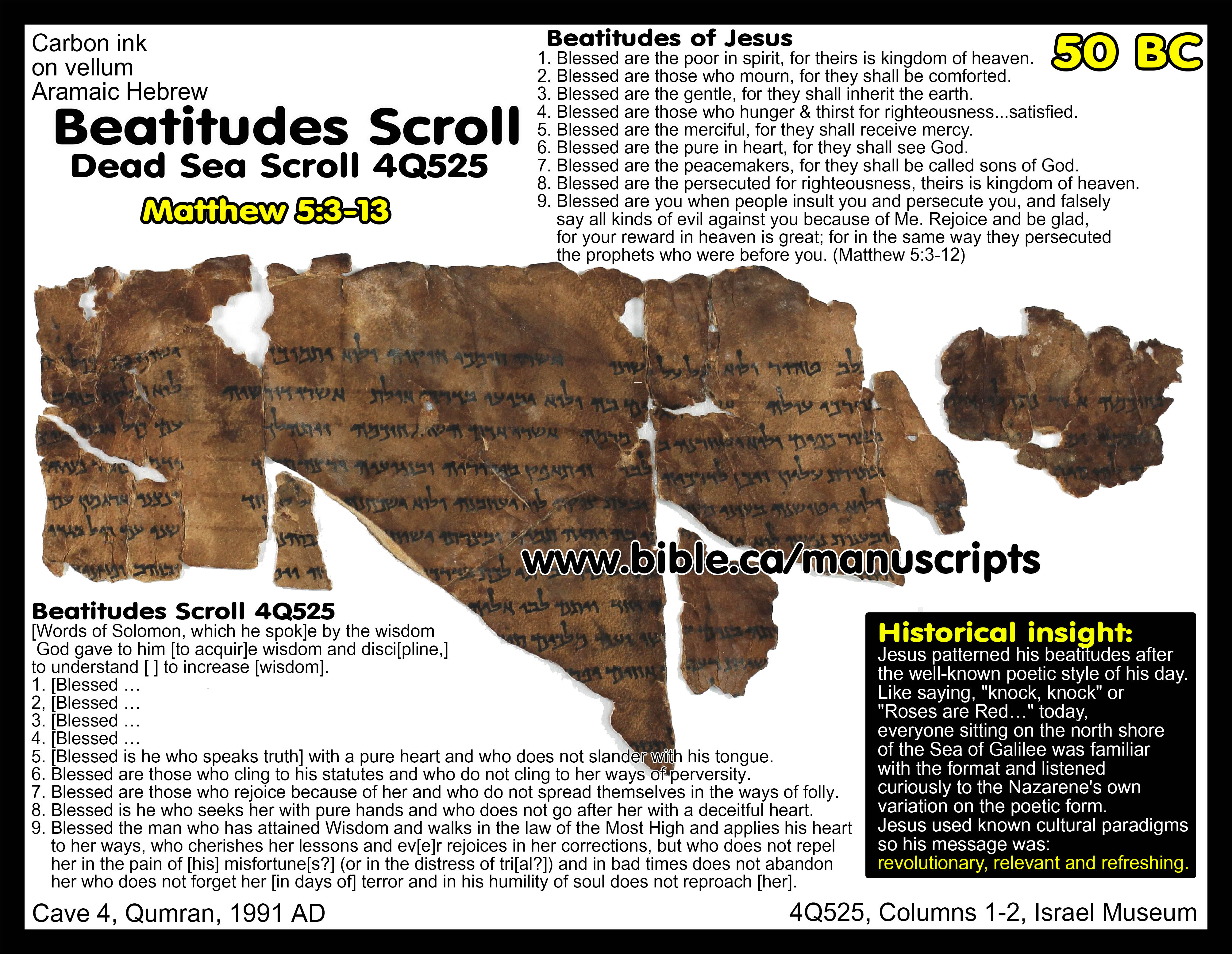Beatitudes of Jesus and the Beatitudes Dead Sea Scroll: 4Q525
Its all about the format of 8 short beatitudes followed by a 9th longer one!
|
Digging up Bible stories!
Historical insight: Jesus patterned his beatitudes after the well-known poetic style of his day with 8 short beatitudes followed by an 9th longer one. Like saying, "knock, knock" or "Roses are Red…" today, everyone sitting on the north shore of the Sea of Galilee was familiar with the format and listened curiously to the Nazarene's own variation on the poetic form. Jesus used known cultural paradigms so his message was: revolutionary, relevant and refreshing.
|
Notice both Jesus’ and Qumran Beatitudes use the same format of 8 short beatitudes followed by a 9th longer one.
|
|
Beatitudes of Jesus 30 AD |
Qumran Beatitudes Scroll 4Q525 50 BC |
|
|
Matthew 5:3-12 |
[Words (or Proverbs) of David (or of Solomon son of David), which he spok]e (or [wrot]e) by the wisdom God gave to him [to … … to acquir]e wisdom and disci[pline,] to understand [ … … ] to increase knowledge or wisdom]. |
|
1 |
“Blessed are the poor in spirit, for theirs is the kingdom of heaven. |
[Blessed … |
|
2 |
“Blessed are those who mourn, for they shall be comforted. |
[Blessed … |
|
3 |
“Blessed are the gentle, for they shall inherit the earth. |
[Blessed … |
|
4 |
“Blessed are those who hunger and thirst for righteousness, for they shall be satisfied. |
[Blessed … |
|
5 |
“Blessed are the merciful, for they shall receive mercy. |
[Blessed is he who speaks truth] with a pure heart and who does not slander with his tongue. |
|
6 |
“Blessed are the pure in heart, for they shall see God. |
Blessed are those who cling to his statutes and who do not cling to her ways of perversity. |
|
7 |
“Blessed are the peacemakers, for they shall be called sons of God. |
Blessed are those who rejoice because of her and who do not spread themselves in the ways of folly. |
|
8 |
“Blessed are those who have been persecuted for the sake of righteousness, for theirs is the kingdom of heaven. |
Blessed is he who seeks her with pure hands and who does not go after her with a deceitful heart. |
|
9 |
“Blessed are you when people insult you and persecute you, and falsely say all kinds of evil against you because of Me.v11“Rejoice and be glad, for your reward in heaven is great; for in the same way they persecuted the prophets who were before you. |
Blessed the man who has attained Wisdom and walks in the law of the Most High and applies his heart to her ways, who cherishes her lessons and ev[e]r rejoices in her corrections, but who does not repel her in the pain of [his] misfortune[s?] (or in the distress of tri[al?]) and in bad times does not abandon her who does not forget her [in days of] terror and in his humility of soul does not reproach [her]. |
|
|
Both use the same format of 8 short beatitudes followed by a 9th longer one. |
|
Introduction:
1. The format of 8 short beatitudes followed by a 9th longer one jumps out at you when you compare Matthew 5 and the “Beatitudes Scroll” (4Q525) that dates to 50 BC.
a. The beatitudes of Jesus are one of the most recognizable examples of ancient poetry on earth.
2. The discovery of the “Beatitudes Scroll”, Dead Sea Scroll (4Q525) at Qumran in cave 4 shows us that Jesus was actually following a known pattern and format his listeners would recognize in His beatitudes.
a. As you can see, the Beatitudes Scroll has
b. This does not take anything away from the profound uniqueness of Jesus’ beatitudes.
c. Only the format and structure is the same but the words are unique.
3. Jesus patterned his beatitudes after the well-known poetic style of his day.
a. Like saying, "knock, knock" or "Roses are Red…" today, everyone sitting on the north shore of the Sea of Galilee was familiar with the format and listened curiously to the Nazarene's own variation on the poetic form.
b. Jesus used known cultural paradigms so his message was: revolutionary, relevant and refreshing.
A. Discussion about Qum’ran Beatitudes Scroll 4Q525
1. “The BeatitudesText 4Q525 is written in an elegant and refined hand (see PAM 40.611, 40.614, 40.617, 40.969, 41.412, 41.520, 41.678, 41.788, 41.866, 41.917, 41.949, 42.441, 42.511, 42.908, 43.595, 43.596, 43.600). The script looks like early Herodian (Puech has reached this conclusion; 1991, 83). The series of five beatitudes found in fragment 2, column ii, catch immediately the reader’s attention. They recall the famous collections of beatitudes in Matthew 5:3–10 and Luke 6:20–23 (see DJG, Sermon on the Mount). However, unlike the NT makarisms, the Qumran beatitudes do not tell us why the person in question is blessed (Viviano 1992, 53–54). The Qumran beatitudes remind us even more of those found in Sirach 14:20–27 and in Proverbs 3:13 and 8:32, 34, which, unlike the NT makarisms, also have “the pursuit of wisdom [ḥwkmh]” as a theme. “Blessed is the man who attains wisdom and walks in the law of the Most High” (frag. 2 ii 3–4; cf. Viviano 1993, 76).” (Dictionary of New Testament Background, C. A. Evans, W. J. Porter, Beatitudes, p151, 2000 AD)
2. “The use of vocabulary in 4Q525 strongly suggests that it is a Qumran sectarian document. Several words are employed in this work that have a Qumranian flavor. They are not necessarily unique to Qumran, but they occur with lesser frequency in the OT. Moreover, several of them are key words in Qumran theology. The terms ˓wlh (“injustice,” frag. 2 ii 7; frag. 4 i 10; frag. 10 i 4), ˓nwh (“humility,” frag. 2 ii 6; frags. 8–9 i 4; frag. 14 ii 20; frag. 26 i 2), sn˓ (“to be humble,” frag. 4 i 10), hlk tmym (“to walk perfectly,” frag. 4 i 10), twkhh (“chastisement,” frag. 4 i 9), hmt tnynym (“poison of snakes,” frag. 15 i 4) and ˒bny ḥpṣ (“stones of desire,” frag. 2 iii 3), which we find in 4Q525, all occur with more frequency in the Qumran sectarian literature than they do in the OT. Also, the particular phrase drk(y) ˓wlh (“the way[s] of injustice,” frag. 2 ii 2) and the idiomatic expression b˒nwt nps̆w (“in the humility of his soul,” frag. 2 ii 6) are not used in the OT, but they do occur in 4Q525 as well as in the Qumran sectarian documents.” (Dictionary of New Testament Background, C. A. Evans, W. J. Porter, Beatitudes, p152, 2000 AD)
B. Puech’s Translation of the Qumran Fragments of 4Q525
|
|
|
|
|
Column I [Words (or Proverbs) of David (or of Solomon son of David), which he spok]e (or [wrot]e) by the wisdom God gave to him [to … … to acquir]e wisdom and disci[pline,] to understand [ … … ] to increase knowledge or wisdom]. Column II [Blessed … … [Blessed … … [Blessed … … [Blessed … … [Blessed is he who speaks truth] with a pure heart and who does not slander with his tongue. Blessed are those who cling to his statutes and who do not cling to her ways of perversity. Blessed are those who rejoice because of her and who do not spread themselves in the ways of folly. Blessed is he who seeks her with pure hands and who does not go after her with a deceitful heart. Blessed the man who has attained Wisdom and walks in the law of the Most High and applies his heart to her ways, who cherishes her lessons and ev[e]r rejoices in her corrections, but who does not repel her in the pain of [his] misfortune[s?] (or in the distress of tri[al?]) and in bad times does not abandon her who does not forget her [in days of] terror and in his humility of soul does not reproach [her]. Column III Thus he thinks always of her and in his misfortune he meditates on [the Law (?) during al]l his existence on it [he reflects (?) and keeps it (?)] before his eyes, in order not to go in the ways off the wicked (?)/folly/impiety (?) and … ] his/her/its [ … ] together and his heart burns for her [ … and a crown of pure] gol[d (she) will place on] his [he]ad and with kings she [will make him] si[t down and … by] his scepter on [ … and amon]g brothers he will deci[de And now, (my) sons, listen to me and] do not re[fuse the words of my mouth, … ] |
|
|
|
C. Beatitudes in: The Wisdom of Ben Sirach (Ecclesiasticus/Sirach 25:1-12)
1. Translation #1:
a. "There are nine who come to my mind as blessed, a tenth, whom my tongue proclaims: Happy is whoever finds joy in his children, and whoever lives to see his enemies’ downfall. Happy is whoever dwells with a sensible wife, and whoever is not plowing with an ox and a donkey combined. Happy is whoever sins not with his tongue, and whoever serves not his inferior. Happy is whoever finds a friend, and whoever speaks to attentive ears. Whoever finds wisdom is great indeed, but not greater than the one who fears the Lord. Fear of the Lord surpasses all else, its possessor is beyond compare." (Wisdom of Ben Sira, AYBC, Sirach 25:1-12, 2008 AD)
2. Translation #2:
With nine thoughts I have gladdened my heart, and a tenth I shall tell with my tongue:
1. A man rejoicing in his children;
2. a man who lives to see the downfall of his foes;
3. Happy is he who lives with an intelligent wife,
4. and he who has not made a slip with his tongue,
5. and he who has not served a man inferior to himself;
6. Happy is he who has gained good sense,
7. and he who speaks to attentive listeners.
8. How great is he who has gained wisdom!
9. But there is no one superior to him who fears the Lord.
D. Beatitudes in: The Wisdom of Ben Sirach (Ecclesiasticus/Sirach 14:20–27)
1. Happy the man who meditates on wisdom, and reflects on knowledge;
2. Who ponders her ways in his heart, and understands her paths;
3. Who pursues her like a scout, and lies in wait at her entry way;
4. Who peeps through her windows, and listens at her doors;
5. Who encamps near her house, and fastens his tent pegs next to her walls;
6. Who pitches his tent beside her and lives as her welcome neighbor;
7. Who builds his nest in her leafage, and lodges in her branches;
8. Who takes shelter with her from the heat, and dwells in her home.
Conclusion:
1. Its all about the format of 8 short beatitudes followed by a 9th longer one!
2. The breathtaking discovery of the Beatitudes scroll as Qumran establishes the famous beatitudes of Jesus Christ firmly into first century culture, long lost for us otherwise recognize today.
a. While had no idea Jesus format of 8 short beatitudes followed by a 9th longer one was a common format in the first century until the discovery of scroll 4Q525 from Qumran, all the first century Christians immediately recognized it.
b. This does not take away from the authenticity of Jesus, it establishes it without question!
c. The beatitudes of Jesus therefore have been confirmed to be authentic early first century Jewish poetry.
3. Historical insights:
a. Historical insight #1: Jesus patterned his beatitudes after the well-known poetic style of his day. Like saying, "knock, knock" or "Roses are Red…" today, everyone sitting on the north shore of the Sea of Galilee was familiar with the format and listened curiously to the Nazarene's own variation on the poetic form. Jesus used known cultural paradigms so his message was: revolutionary, relevant and refreshing.
b.
Historical insight #2: Song of the Sabbath Sacrifice scroll
4Q401: John patterned Revelation after the well-known apocalyptic genre of his
day found in the famous first century songbook called “Angelic Liturgy”. Like
saying, "knock, knock" or "Roses are Red…" today, the
Christians in Jerusalem immediately recognized the format and read intently to
this new variation of a well known poetic form. The Holy Spirit used known
cultural paradigms so John’s warning to flee Jerusalem, echoing Mathew 24 and
Luke 21 was: revolutionary, relevant and authentic.
See detailed
outline of the Songs of Sabbath Sacrifice, Angelic Liturgy: First century
songbook

4. What we read in the book, we find in the ground, or in this case in a papyrus manuscript that dates to 150 BC.
By Steve Rudd: Contact the author for comments, input or corrections.


